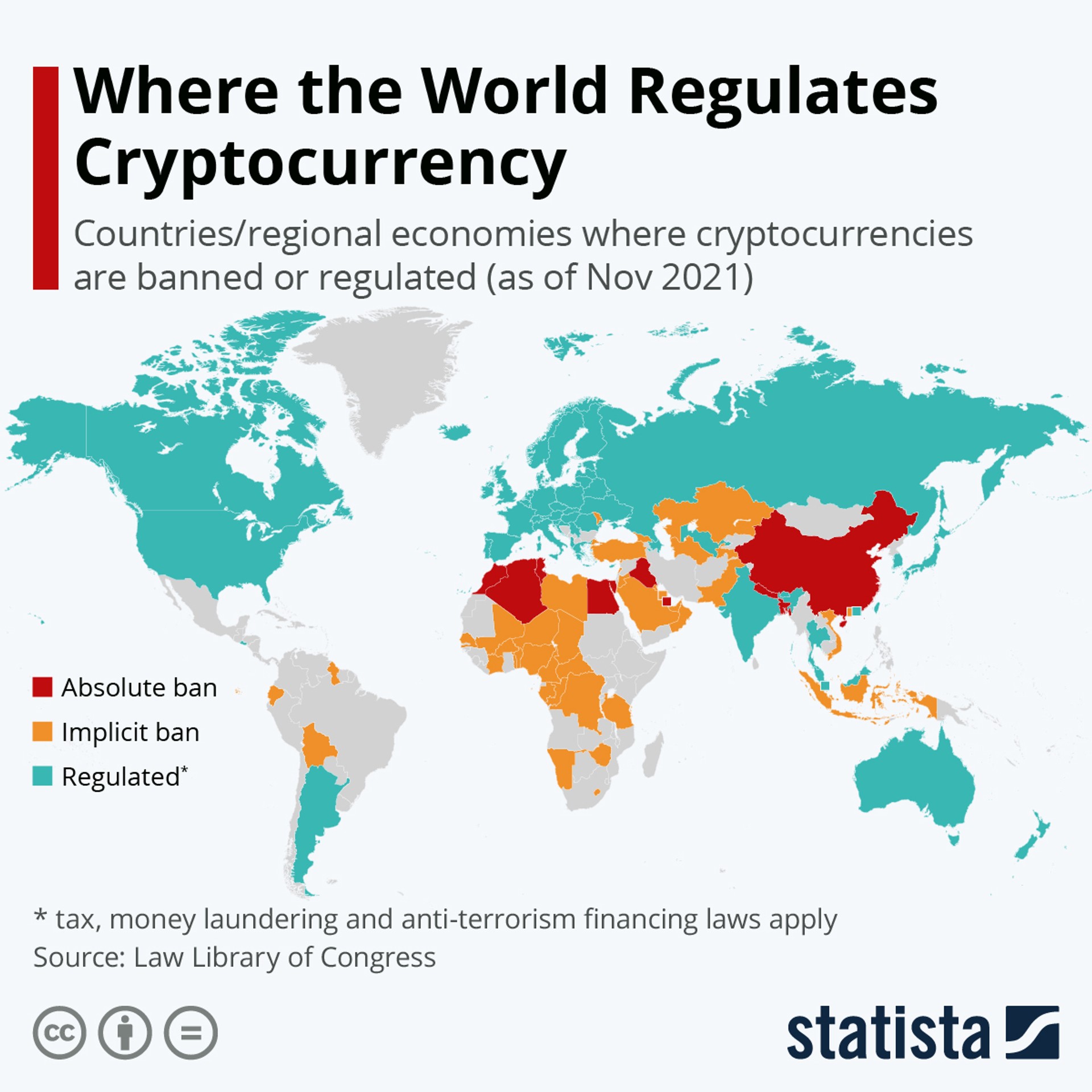Is polygon secure?
Polygon is still a “young” currency. That’s why many countries still don't allow the use of polygon as a payment method. On top of that, polygon can be used as an investment, where it’s also connected to uncertainty and risks.
It’s also important to point out that polygon is built on top of ethereum’s blockchain . That means that polygon’s security not only depends on the team behind polygon, but also depends on the team behind ethereum.
So to answer the question: “Is polygon safe?”, we first have to look at the 3 topics separately:
- Which countries allow the use of polygon, and which countries don’t?
- Why is polygon as an investment connected to risks and uncertainty?
- What impact does it have security-wise that polygon is building on ethereum’s blockchain?
Which countries allow polygon as a payment method?
If you’re planning to use polygon as a payment method , it can be an uncertain currency to sit on. Not all countries allow polygon and other cryptocurrencies as a legal payment method.
On the map from Statista you can see which countries who:
- regulates crypto (blue)
- implicitly bans crypto (yellow)
- directly bans crypto (red)
What makes polygon an unsafe investment?
There’s a risk that you could lose some or the entirety of your investment when trading polygon and other cryptocurrencies. Polygon and cryptocurrencies in general are unregulated assets, which means that there’s no central authority to protect consumers. If you have money in a bank and the bank goes bankrupt, your money is protected by a central authority on amounts equal to 100,000 euro (around 750,000 DKK). In Denmark, that central authority is called Garantiformuen.
But if you lose your polygons following a crypto platform bankrupting, you’re not protected by any central authorities.
That’s what makes polygon an unsafe investment .
On top of that, polygon is a very volatile asset . That means that the price of polygon can rise and drop very quickly. The more volatile an investment is, the more unsafe it is. The same goes for any other asset.
If you’re thinking about buying a house, you’d be way more cautious to buy it, if you knew that the price of the house could lose up to 100% of its value from one day to the next. At the same time, there’s also the possibility that the house suddenly would be worth 10 times as much the next day. That’s kind of how polygon and cryptocurrencies work. Before you buy polygon, you need to evaluate whether the investment corresponds to your willingness to take risks.
What does it mean that polygon builds on ethereum’s blockchain?
Polygon is a so-called layer 2 scaling solution. That means that polygon is developed on top of ethereum’s blockchain with the intention of improving ethereum’s technology.
Behind the development of polygon, you’d also find part of ethereum's development team. When they were working on ethereum, they spotted some issues that they set out to solve with polygon as a project.
But this also means that polygon can never be more safe than ethereum. And here it’s also important to note that the polygon team is yet another layer of humans and technological solutions you’d need to trust.Before you can put your trust in polygon, you’d also need to trust ethereum, whereas with ethereum and bitcoin for example, you’d “only” need to trust a single blockchain.
No matter what, you need to be aware of the risks that any type of cryptocurrency involves. You can read more about the risks of cryptocurrency here .
Cryptocurrencies can rise and fall
When you trade cryptocurrencies, you need to be aware that it carries a large risk. The value of your cryptocurrency can both rise and fall, and you can risk losing the entire amount you’ve invested in cryptocurrencies.
Cryptocurrency trading is done through Lunar Block. Lunar Block is not regulated by the Danish Financial Supervisory Authority (Finanstilsynet). That means you won’t have the same protection as when trading e.g. stocks or other regulated assets.
We do not counsel
We do not advise on currencies and do not make recommendations for either buying or selling. We can provide factual information about the different currencies, but past price developments are not an indication of future developments.
No information from Lunar Block should therefore be considered as recommendations and all decisions are up to you alone.
Last updated April 18, 2023. We’ve collected general information. Please note, that there may be specific circumstances that you and your business need to be aware of.
You might also like...
Where can I pay with solana?
Cryptocurrency is becoming so widespread and acknowledged abroad that you can use the currency just like regular payment methods on some...
How do you buy solana as regular stocks?
Because solana (SOL) is a currency, and not a business, you can’t actually invest directly in solana like it’s a stock.
Are cryptocurrencies a good investment?
Cryptocurrencies can be a great addition to your portfolio - if you’re willing to run the risk. Cryptocurrencies are “high risk - high...
What is bitcoin?
Bitcoin is a digital currency, or cryptocurrency, as it’s also called. Bitcoin is the first and largest cryptocurrency measured on market...



